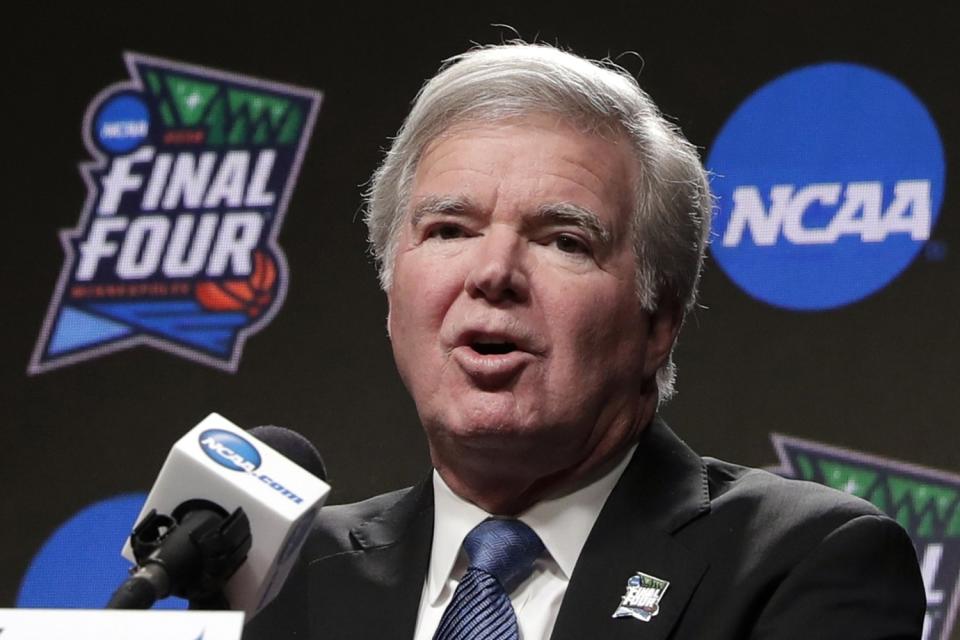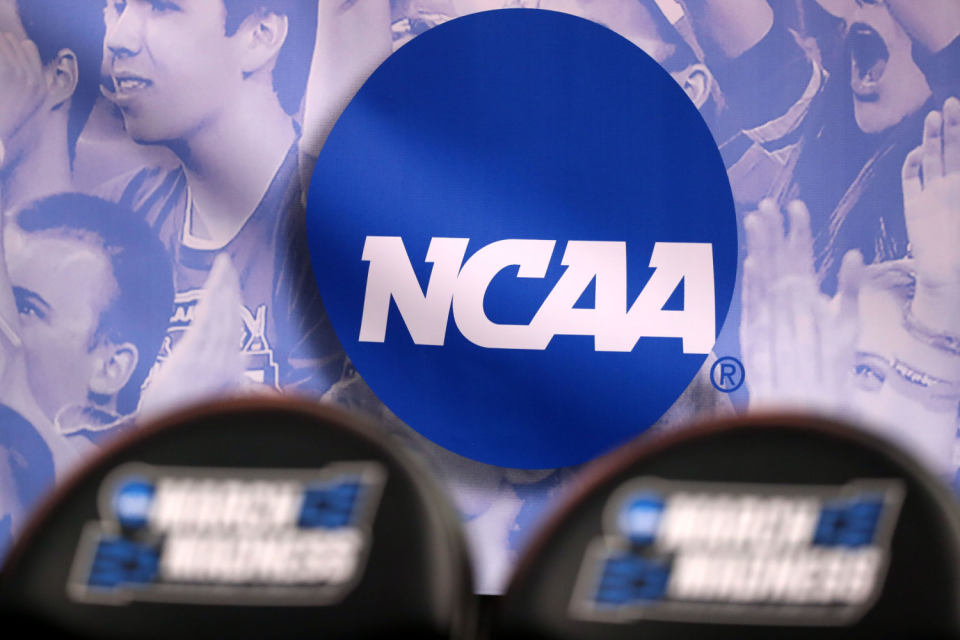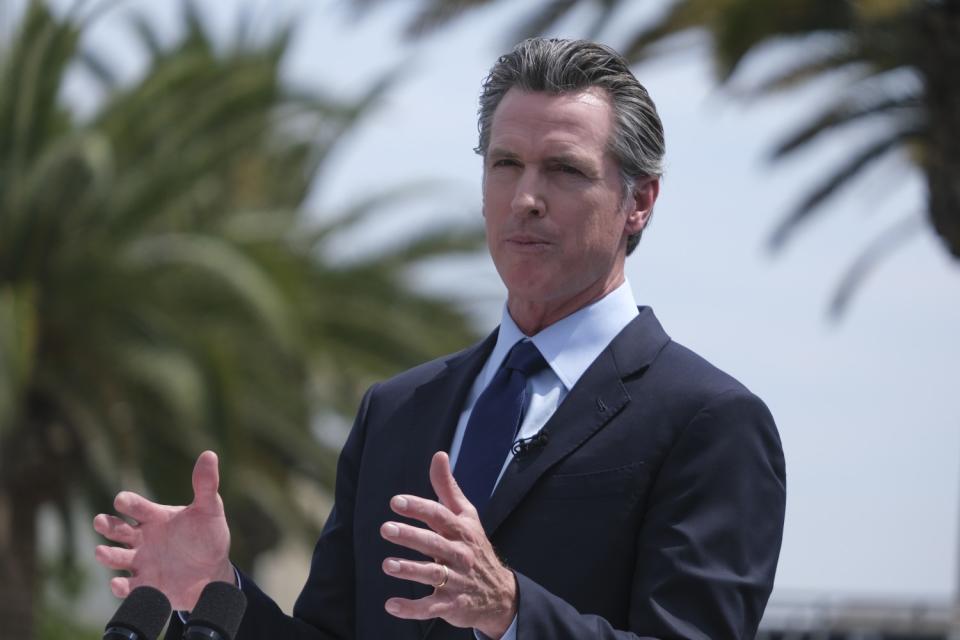Supreme Court rules against NCAA over athlete compensation: Here's what you need to know

Should college athletes be compensated beyond the value of an education? The Supreme Court waded into that debate Monday, ruling against the NCAA’s strict rules on amateurism that ban schools from providing perks like paid internships, postgraduate scholarships and free laptops.
While narrow, the justices’ unanimous decision — upholding a U.S. 9th Circuit Court of Appeals finding that schools were violating antitrust law in setting limits on athletes’ education-related benefits — hinted that further change is inevitable. Writing in a separate opinion, Justice Brett M. Kavanaugh said that the “NCAA’s business model would be flatly illegal in almost any other industry in America.”
The Supreme Court's action comes as the NCAA's rules prohibiting college athletes from profiting off the use of their name, image and likeness (NIL) are squarely in the crosshairs of state legislators from coast to coast. California jumped ahead in the fall of 2019 with the first state law restoring NIL rights to college athletes, allowing them to be paid for endorsement deals and the like without fear of NCAA punishment starting in 2023. Dozens of states have followed since, and some laws are scheduled to go into effect July 1.
Schools may not be ready for the chaos to come, but if so, it won't be because they didn't have enough time to prepare.
When former UCLA basketball star Ed O’Bannon put his name on the historic class-action suit that took the NCAA to trial for antitrust violations related to NIL in 2014, he took the first steps toward creating today’s activist energy in a downtown Oakland court room. The movement has only intensified from there, and it seems college sports will never be simple again.
“We’ve become a multibillion-dollar business, and when that happens people are going to look at your business,” UCLA men's basketball coach Mick Cronin said Monday. “The first thing people are going to say is, well, what about the employees?
"The days of Kareem Abdul-Jabbar just being thankful to play at UCLA are over. The days of Bill Walton just playing at UCLA and being thankful for the scholarship are over.”
What was argued in NCAA v. Alston?

A group of former college athletes brought an antitrust suit to put the NCAA under the scrutiny of the Sherman Act once again. The athletes hoped the court would strike down all of the NCAA’s rules against pay for play, but the lower courts would only go as far as to say there should not be limits on benefits related to education. The thinking was that such benefits — postgraduate internships, vocational training and resources such as computers and iPads — would only serve to differentiate between college sports and professional sports.
While the NCAA could have viewed that as a victory — since the lower courts were willing to accept its justification for keeping limits on non-education-related benefits — the association decided to appeal to the Supreme Court. But the high court upheld that limits on educational benefits were unlawful and unnecessary.
How does this apply to USC, UCLA and the everyday operation of college sports?
The USC and UCLA athletic departments can now offer whatever they want in education-related benefits to athletes. If the Trojans want to give every football and men’s basketball player a postgraduate scholarship in the field of their choice, they can. If the Bruins want to spring for the fanciest iPads for every athlete, they can.
Expect schools to get creative.
“Do you put money away for guys that they’ll get when they graduate?” Cronin asked. “That’s a layer that’s not coming July 1 like the NIL, but it’s coming. Instead of waiting until the last minute to try to all come in the same room and agree on this NIL, we need to realize that these days are coming, and the government’s going to force these days upon us, so our leadership needs to get ahead of it.”
Why is the NCAA concerned about educational benefits?
The NCAA’s worry is that schools will live in the gray areas of the rule book to disguise pay-for-play recruiting inducements as educational opportunities.
“The NCAA fears schools might exploit this authority to give student-athletes ‘luxury cars’ ‘to get to class’ and ‘other unnecessary or inordinately valuable items’ only ‘nominally’ related to education,” Justice Neil M. Gorsuch wrote. “Again, however, this over-reads the injunction in ways we have seen and need not belabor. Under the current decree, the NCAA is free to forbid in-kind benefits unrelated to a student’s actual education; nothing stops it from enforcing a ‘no Lamborghini’ rule.”
The court’s opinion says the NCAA can propose new rules that police these educational benefits.
“While today’s decision preserves the lower court ruling, it also reaffirms the NCAA’s authority to adopt reasonable rules and repeatedly notes the NCAA remains free to articulate what are and are not truly educational benefits,” the NCAA said in a statement.
If making new rules that impose fresh limits, the NCAA would have to tread lightly to protect itself against new litigation.
How does this affect name, image and likeness rules?

The Alston case is about what schools can offer athletes directly from their coffers. NIL is about payments from third parties to athletes for endorsements, sponsorships, autographs, appearances, etc.
With both educational benefits and NIL, the NCAA can continue its delicate amateurism song and dance because the schools are not directly paying the athletes for playing their sport. Therefore they can be classified as students on scholarship and not university employees, and so neither will fully implode the amateur model.
The NCAA was supposed to vote on new NIL allowances in January but put it off to see if the Supreme Court would rule in their favor in Alston. Now? Again, the schools will have to tread more lightly in placing “guardrails” on NIL that appear unnecessarily stringent.
What’s next?
The NCAA Division I Council, which votes on rule changes, is set to meet Tuesday and Wednesday. Now that the schools know that the dream of an antitrust exemption appears off the table, the NIL rules can take shape with that in mind.
On July 1, at least six states’ NIL laws will go into effect. Schools located in states without active NIL laws will follow NCAA rules.
When will California’s law take effect?

California’s SB 206 may have been the first state bill to become law, but state legislators took a conservative approach with their effective date of Jan. 1, 2023, giving the NCAA ample time to amend its rules.
Now that other states jumped ahead of California by 18 months, the state legislature is considering a bill, SB 26, to fast-track players being able to make money from endorsement deals as soon as Gov. Gavin Newsom adds his signature.
For now, though, California college athletes must wait.
What would a congressional bill look like?
The NCAA remains hopeful that Congress will pass a one-size-fits-all federal solution for NIL, but it should worry that the Supreme Court’s opinion will embolden Democratic senators to push for broad reform that includes protections for athlete health and safety along with full NIL rights.
Justice Kavanaugh’s scalding concurring opinion in the Alston case should add fuel to the fire for college athlete activists across the country in the coming months.
“All of the restaurants in a region cannot come together to cut cooks’ wages on the theory that ‘customers prefer’ to eat food from low-paid cooks," Kavanaugh wrote. "Law firms cannot conspire to cabin lawyers’ salaries in the name of providing legal services out of a ‘love of the law.’ Hospitals cannot agree to cap nurses’ income in order to create a ‘purer’ form of helping the sick. News organizations cannot join forces to curtail pay to reporters to preserve a ‘tradition’ of public-minded journalism. Movie studios cannot collude to slash benefits to camera crews to kindle a ‘spirit of amateurism’ in Hollywood.
“Price-fixing labor is price-fixing labor.”
Times reporter Ben Bolch contributed to this report.
This story originally appeared in Los Angeles Times.

